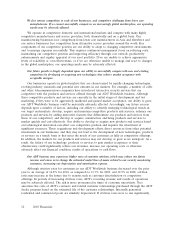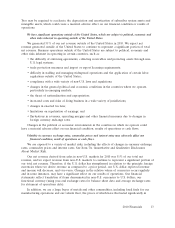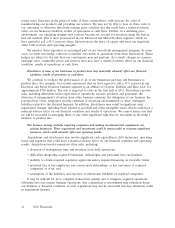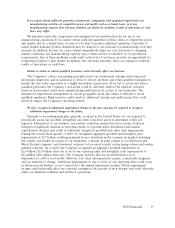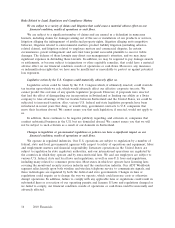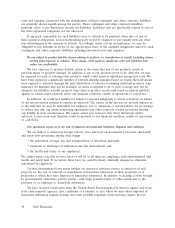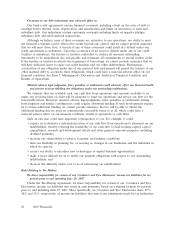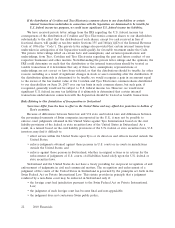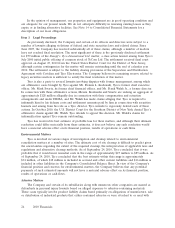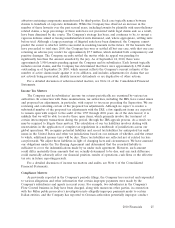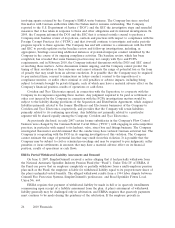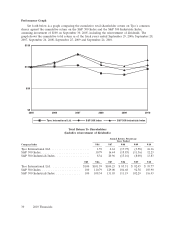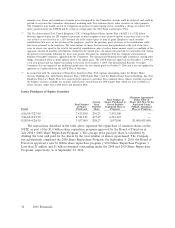ADT 2010 Annual Report Download - page 110
Download and view the complete annual report
Please find page 110 of the 2010 ADT annual report below. You can navigate through the pages in the report by either clicking on the pages listed below, or by using the keyword search tool below to find specific information within the annual report.If the distribution of Covidien and Tyco Electronics common shares to our shareholders or certain
internal transactions undertaken in connection with the Separation are determined to be taxable for
U.S. federal income tax purposes, we could incur significant U.S. federal income tax liabilities.
We have received private letter rulings from the IRS regarding the U.S. federal income tax
consequences of the distribution of Covidien and Tyco Electronics common shares to our shareholders
substantially to the effect that the distribution of such shares, except for cash received in lieu of
fractional shares, will qualify as tax-free under Sections 355 and 368(a)(1)(D) of the Internal Revenue
Code of 1986 (the ‘‘Code’’). The private letter rulings also provided that certain internal transactions
undertaken in anticipation of the Separation would qualify for favorable treatment under the Code.
The private letter rulings relied on certain facts and assumptions, and certain representations and
undertakings, from Tyco, Covidien and Tyco Electronics regarding the past and future conduct of our
respective businesses and other matters. Notwithstanding the private letter rulings and the opinions, the
IRS could determine on audit that the distribution or the internal transactions should be treated as
taxable transactions if it determines that any of these facts, assumptions, representations or
undertakings are not correct or have been violated, or that the distributions should be taxable for other
reasons, including as a result of significant changes in stock or asset ownership after the distribution. If
the distribution ultimately is determined to be taxable, we would recognize a gain in an amount equal
to the excess of the fair market value of the Covidien and Tyco Electronics common shares distributed
to our shareholders on June 29, 2007 over our tax basis in such common shares, but such gain, if
recognized, generally would not be subject to U.S. federal income tax. However, we would incur
significant U.S. federal income tax liabilities if it ultimately is determined that certain internal
transactions undertaken in connection with the Separation should be treated as taxable transactions.
Risks Relating to Our Jurisdiction of Incorporation in Switzerland
Swiss laws differ from the laws in effect in the United States and may afford less protection to holders of
Tyco’s securities.
Because of differences between Swiss law and U.S state and federal laws and differences between
the governing documents of Swiss companies incorporated in the U.S., it may not be possible to
enforce court judgments obtained in the United States against Tyco International based on the civil
liability provisions of the federal or state securities laws of the United States in Switzerland. As a
result, in a lawsuit based on the civil liability provisions of the U.S. federal or state securities laws, U.S.
investors may find it difficult to:
• effect service within the United States upon Tyco or its directors and officers located outside the
United States;
• enforce judgments obtained against those persons in U.S. courts or in courts in jurisdictions
outside the United States; and
• enforce against those persons in Switzerland, whether in original actions or in actions for the
enforcement of judgments of U.S. courts, civil liabilities based solely upon the U.S. federal or
state securities laws.
Switzerland and the United States do not have a treaty providing for reciprocal recognition of and
enforcement of judgments in civil and commercial matters. The recognition and enforcement of a
judgment of the courts of the United States in Switzerland is governed by the principles set forth in the
Swiss Federal Act on Private International Law. This statute provides in principle that a judgment
rendered by a non-Swiss court may be enforced in Switzerland only if:
• the foreign court had jurisdiction pursuant to the Swiss Federal Act on Private International
Law;
• the judgment of such foreign court has become final and non-appealable;
• the judgment does not contravene Swiss public policy;
22 2010 Financials


